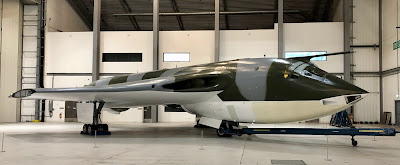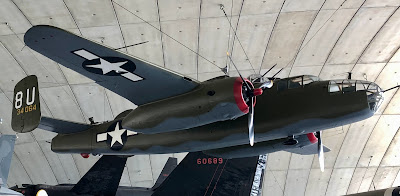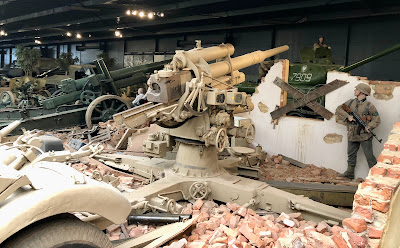On Tuesday, I had a meeting in Cambridge, so it would be rude not to visit the Imperial War Museum's site at Duxford. I haven't been for many years. This is the IWM's collection of aircraft exhibits and much more. It is still a working airfield, and it has a collection of working preserved aircraft. Almost every day, Spitfires roll down the runway.
Duxford became an airfield during WW1, and in the interwar years, it trained hundreds of RAF pilots. Then, as WW2 beckoned, it was a sector station of 12 Group, playing a key role in the Battle of Britain. This was the 'Big Wing' base of five squadrons, including 310 Squadron led by Douglas Bader. The Americans arrived in 1943, and the Spitfires were replaced by Mustangs and Thunderbolts escorting the bombers over Europe. After the war, it remained a fighter base for Meteors, Hunters and Lightnings before it closed in 1961. In 1968 it was handed over to the IWM.
The main aircraft displays are in hangers where just about every British warplane can be seen and a fair few civil airliners as well.
 |
| The Fairey Swordfish |
 |
| Lysander |
 |
| The elegant Vulcan |
 |
| To the ugly Victor |
Also in the Air Space Hanger is the Parachute and Air Assualt Museum. One of several sub-museums on site.
 |
I liked the positioning of the Piat and the Milan to show how the AT technology has changed.
|
 |
| And all the different transport paras used. |
Then it was outside to watch a Spitfire take off.
Other flying aircraft can be seen in their own hanger used by private and commercial owners.
There is, of course, a Battle of Britain hanger that also has post-war planes.
Finally, the Land Warfare Hall, which includes the Anglian Regiment Museum. Putting the exhibits into context is really well done.
A cracking day out. Highly recommended.


















Great photos. It is a museum I'd love to visit.
ReplyDeleteCheers,
Pete.
You lucky fella. Some nice kit there. Thanks for the pictures 👏
ReplyDeleteCheers,
Geoff
Looks like an excellent museum!
ReplyDelete